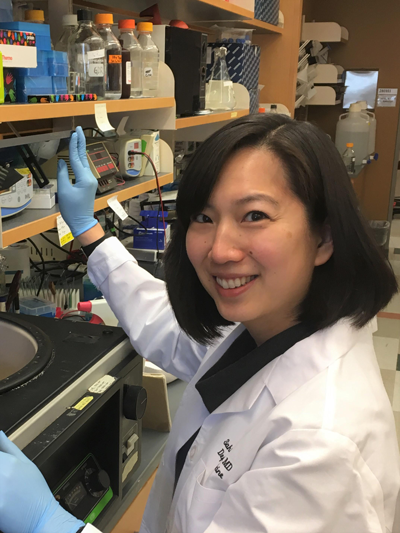 |
|
|
Sakiko Suzuki, MD |
Sakiko Suzuki, MD, instructor in medicine, has been named a 2017 recipient of the highly competitive Damon Runyon Physician-Scientist Training Award, according to theDamon Runyon Cancer Research Foundation. Dr. Suzuki is one of only four recipients and will receive $460,000 over the course of the four-year program.
The awardees were selected through a highly competitive and rigorous process by a scientific committee comprising leading cancer researchers who are themselves physician-scientists. Only those scientists showing exceptional promise and a passion for finding new cures for cancer are selected to receive the award.
“Too often, medical students and recent graduates discover their passion for research when it is too late to join an MD/PhD program or otherwise acquire the experience they need to pursue a research career,” said Lorraine W. Egan, president and CEO of Damon Runyon. “Physicians are essential to cancer research but often lack the opportunity and grant support needed to become researchers. We felt it was important to create that opportunity and hope that other organizations will use this award as a model.”
The goal of the program is to increase the number of physician-scientists by providing physicians who have earned an MD degree and completed clinical specialty fellowship training the opportunity to gain the research skills and experience they need to become leaders in translational and clinical research. The program was launched in 2015.
Suzuki, whose mentor is Glen Raffel, MD, PhD, associate professor of medicine, is focused on new types of therapies for leukemia that directly target the disease without harming the normal cells of the body. She said a gene called MPL encodes a protein found to be important for the growth and survival of a significant proportion of Acute myeloid leukemias (AMLs) and other blood diseases including essential thrombocythemia (ET), a malignancy affecting the platelet-producing cells of the bone marrow. Suzuki has been focusing on the function of a truncated variant of MPL produced by splicing out a section of the MPL RNA message used to make the protein. This variant, MPL-TR, opposes the function of MPL in cells; she believes that increasing MPL-TR in leukemia cells will suppress their growth. The principles founded by this project would also be broadly applicable for targeting splicing in other genes essential for multiple forms of leukemia and lymphoma.
Related story on UMassMedNow:
UMMS researcher named 2015 Damon Runyon Fellow